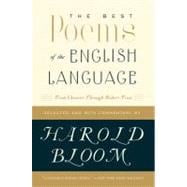
What is included with this book?
The New copy of this book will include any supplemental materials advertised. Please check the title of the book to determine if it should include any access cards, study guides, lab manuals, CDs, etc.
The Used, Rental and eBook copies of this book are not guaranteed to include any supplemental materials. Typically, only the book itself is included. This is true even if the title states it includes any access cards, study guides, lab manuals, CDs, etc.
Poetry essentially is figurative language, concentrated so that its form is both expressive and evocative. Figuration is a departure from the literal, and the form of a great poem itself can be a trope ("turning") or figure. A common dictionary equivalent for "figurative language" is "metaphorical," but a metaphor actually is a highly specific figure, or turning from the literal. Kenneth Burke, a profound student of rhetoric, or the language of figures, distinguished four fundamental tropes: irony, synecdoche, metonymy, and metaphor. As Burke tells us, irony commits those who employ it to issues of presence and absence, since they are saying one thing while meaning something so different that it can be the precise opposite. We learn to wince when Hamlet says: "I humbly thank you" or itsequivalent, since the prince generally is neither humble nor grateful.
We now commonly call synecdoche "symbol," since the figurative substitution of a part for a whole also suggests that incompletion in which something within the poem stands for something outside it. Poets frequently identify more with one trope than with the others. Among major American poets, Robert Frost (despite his mass reputation) favors irony, while Walt Whitman is the great master of synecdoche.
In metonymy, contiguity replaces resemblance, since the name or prime aspect of anything is sufficient to indicate it, provided it is near in space to what serves as substitute. Childe Roland, in Browning's remarkable monologue, is represented at the very end by the "slug-horn" or trumpet upon which he dauntlessly blows: "Childe Roland to the Dark Tower came."
Metaphor proper transfers the ordinary associations of one word to another, as when Hart Crane beautifully writes "peonies with pony manes," enhancing his metaphor by the pun between "peonies" and "pony." Or again Crane, most intensely metaphorical of poets, refers to the Brooklyn Bridge's curve as its "leap," and then goes on to call the bridge both harp and altar.
Figurations or tropes create meaning, which could not exist without them, and this making of meaning is largest in authentic poetry, where an excess or overflow emanates from figurative language, and brings about a condition of newness. Owen Barfield's Poetic Diction: A Study in Meaning is one of the best guides to this process, when he traces part of the poetichistory of the English word "ruin."
The Latin verb ruo, meaning "rush" or "collapse," led to the substantive ruina for what had fallen. Chaucer, equally at home in French and English, helped to domesticate "ruin" as "a falling":
Min is the ruine of the highe halles,One feels the chill of that, the voice being Saturn's or time's in "The Knight's Tale." Chaucer's disciple Edmund Spenser, has the haunting line:
The old ruines of a broken towerMy last selection in this book is Hart Crane's magnificent death ode, "The Broken Tower," in which Spenser's line reverberates. Barfield emphasizes Shakespeare's magnificence in the employment of "ruin," citing "Bare ruin'd choirs where late the sweet birds sang" from Sonnet 73, and the description of Cleopatra's effect upon her lover: "The noble ruin of her magic, Antony." I myself find even stronger the blind Gloucester'spiercing outcry when he confronts the mad King Lear (IV, VI, 134–135):
O ruin'd piece of nature! This great worldOnce Barfield sets one searching, the figurative power of "ruined" seems endless. Worthy of Shakespeare himself is John Donne, in his "A Nocturnal upon St. Lucy's Day," where love resurrects the poet to his ruin:
Study me then, you who shall lovers beBarfield invokes what he rightly calls Milton's "terrific phrase": "Hell saw / Heaven ruining from Heaven," and then traces Wordsworth's allusive return to Milton. Rather than add further instances, I note Barfield's insight, that the figurative power of "ruin" depends upon restoring its original sense of movement, of rushing toward a collapse. One of the secrets of poetic rhetoric in English is to romance the etonym (as it were), to renew what Walter Pater called the "finer edges" of words.
The Best Poems of the English Language
Excerpted from The Best Poems of the English Language: From Chaucer Through Robert Frost by Harold Bloom
All rights reserved by the original copyright owners. Excerpts are provided for display purposes only and may not be reproduced, reprinted or distributed without the written permission of the publisher.